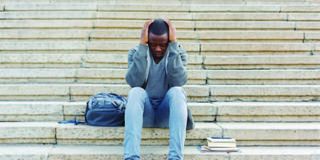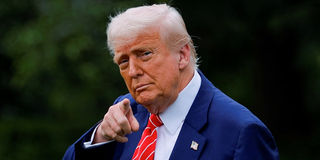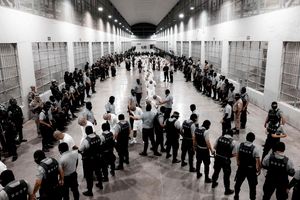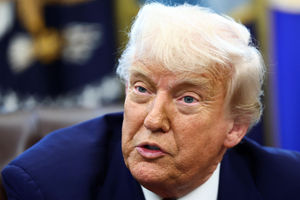
Students report lost sleep, erased social media footprints, and eleventh-hour cancellations of long-awaited reunions.
It is midnight in the US, about 7am Kenyan time, and the East African students are all awake. They will not speak on camera.
They pick up my calls using virtual private networks (VPN). Those on camera, their faces stay hidden. They do not also wish to be identified by their full name due to fear of being targeted by the Donald Trump administration.
Some hang up mid-conversation—just in case someone is listening in. The longest we could talk is about three to four minutes, then they say, “I will call you later.” Others share information via WhatsApp messages, ensure I have read it and immediately “delete for everyone”, leaving no trace. A couple of the students said they wanted to stay off the media.
“I don’t want to be caught up in the government scandals, I fear being deported, I fear being denied visa renewal,” they say.
Despite valid visas and spotless academic records, many students from Kenya and other East African countries, who got opportunities to study in the US now fear leaving the country — even for family funerals, summer break or visa renewals — worried they will be denied re-entry or worse, detained at the border. Universities have issued quiet warnings, legal aid sessions are held behind closed doors, and WhatsApp group chats now double as emergency lifelines.
The “American Dream”, once marketed as a global opportunity engine, now comes with anxiety. For some of the students, the cost of education is no longer just tuition — but silence, trying to stay unseen, and fear of being deported.
“We came here to study,” one student told Saturday Nation, whispering during an encrypted call. “Now we live like fugitives.”
Rotich from Eldoret, Kenya, is among them. Like thousands of other young people across Africa, he always dreamt of attending a top university in the US or the UK.
He says he was the kind of child who built radio circuits from scrap metal, picked up from garbage sites or roadsides.
Despite doing his homework under a paraffin lamp (koroboi), he saw himself joining MIT (the prestigious Massachusetts Institute of Technology). He did not join MIT, but got a partial scholarship to an engineering school in Pennsylvania, US. When he got his student visa, his village came together to raise funds for his air ticket, a one-way ticket to a new life.
“They told me, ‘You’re our future. Go and bring us back light (electricity),’” he tells Saturday Nation.
But now his family is constantly worried that their son’s dream is at stake.
“I keep getting messages from my aunt in Kenya every time there is a headline (of deportation, of Trump new laws),” says Rotich. “She’s scared. She tells me, ‘Don’t protest, don’t speak, just finish and come back home alive.”

US President Donald Trump gestures during a "Summer Soiree" held on the South Lawn of the White House in Washington, DC, US, June 4, 2025.
Rotich has not seen his family in three years and he was hoping to see them recently.
“I missed my sister’s wedding and my grandmother’s funeral. But I can’t risk it. If I leave, I might never come back.”
Despite all, he says he is building prototypes with the hope that one day he will establish his own energy firm, and provide electricity in his rural home in Eldoret.
Twelve countries
This is not only Rotich’s story; it is the new reality for thousands of African students living in the US in an era of shifting immigration policy, sweeping travel bans, and digital surveillance. Since the reintroduction of Executive Order 14161 by President Donald Trump on June 2025, barring entry from 12 countries, including Sudan, Somalia, Eritrea, and Libya, many students even those who are not from these countries are scared.
For Asha, her dream began in Addis Ababa, where she grew up in a modest home. Her parents saw education in the US as her leap into a different life from how they had raised Asha.
“I would watch YouTube videos of Harvard University lectures at night,” she recalls. I pictured myself in that room, learning from the best, asking questions that made a difference,” she says.

Harvard University in Boston, US.
Luck was on her side, and she went to the US on a student visa, got an undergraduate degree, went back to Addis Ababa and returned to the US for her postgraduate studies.
But now Asha, who is studying in Rhode Island, worries if her parents will be allowed to see her graduate in the coming months.
“The American education system used to provide you with so much freedom,” Asha says, “But now freedom is nothing but an illusion. We’re not secure.”
Juma, a Tanzanian, is studying medicine in the US, a profession that he was drawn into after watching traditional healers deceive the sick in his rural home.
“I knew I had to go away and learn how to help. One day, I will build a hospital in my rural area,” he says.
Juma is in a university in Massachusetts state, and his visa renewal in Tanzania is due. But he says travelling back home is akin to “playing Russian roulette with your soul.”
From asking questions in class
As for Susan, a Ugandan, books, radio debates, and a sense of justice shaped her ambitions. Her mother, a single mother and a community organiser sparked her desire to study politics.
“But I wanted to learn about political science in the US, not Uganda because the US is where the world is made. I wanted to be in the rooms where the world gets made.”
When Susan joined the university, she was outspoken. But she says since she recently attended a pro-campus rally, she is being targeted.
“I’ve had to change apartments three times. I’m constantly looking over my shoulder,” she says. “I don’t post anything political on my social media anymore. I even closed some of my social media accounts.”
But her activism had not died with the new Trump rules. Susan helps organise student support groups, sharing legal resources, mental health help, and strategies to stay safe, but quietly.

US President Donald Trump gestures, as he departs for Pennsylvania, on the South Lawn of the White House in Washington, DC on May 30, 2025.
“So many students are scared. We’ve gone from asking questions in class to asking if we’ll be deported,” she says, “we came to the US to study, but we are learning how to fear.”
Use VPNs
“Every time we speak to someone outside, we risk everything,” adds Joshua, a Ugandan graduate student and student leader at a US university. “We turn off our locations, we use VPNs, and we spend less time on social media. No posts. No likes. No shares. Even silence is safer than one wrong click.”
Joshua is among those who also organises forums for African students over encrypted Zoom links, sharing legal advice and community support.
“Before every session, I tell people to delete their messages and browser history,” he says, speaking quietly from his dimly lit dorm room. “We may be speaking out, but we’re all terrified of being tracked. They (the Trump government) don’t require much to take you down these days.”
His student’s forum is growing but cautiously. “We may be far from home, but we’re not powerless,” he says. “We have to share legal resources, mental health support, and stories. It’s not just resistance. It’s survival.”
I asked a Rwandan student to talk about her experience, she agreed at first but requested to hang up mid-call, “just in case someone is listening.”
Erase themselves
Diane, who still dreams of working in international diplomacy, says all is not lost. “I’m being trained to build better systems in a country that’s afraid of mine.”
The soft-spoken Rwandan student is studying international development, also in a US university. She sends brief text messages that erase themselves. “Don’t write where I am. Don’t say my whole name,” she implored during a WhatsApp call. “I’ve unfollowed posts. I’ve unfollowed advocacy pages. I don’t even email my professors if the question is political-sounding. It’s not worth it.”
She pauses before adding: “It’s not just what you do now. It’s what you posted three years ago, what you signed, what petition you liked, what article you read. Anything can be traced. And we are watched.”
She adds: “Not long ago, this (the US) was the safest place to learn. Now, it feels like people are watching us in our classrooms.”
The personal toll is mounting. Students report lost sleep, erased social media footprints, and eleventh-hour cancellations of long-awaited reunions. The campus climate in America, once a sanctuary of intellectual exploration, is no longer the same. Recent immigration raids and the re-implementing of Executive Order 14161 have placed many US colleges on high alert, quietly gearing up for what some administrators call a “new age of academic surveillance.”
“There is a sense of mistrust now, even in institutions we respected,” she says. “It feels like the ground we were standing on isn’t as solid anymore,” Diane says.
Reset his phone
Pascal, from Burundi, feels the same. “Every time I speak to someone outside of my network, even to journalists, I wonder whether this will be the thing that marks me.”
He had done an interview in January, which he has now erased from his phone, cleared his cache, and reset his phone. “It sounds extreme, but this is survival now. One false move, one file, one word and that’s it.”
He says what he is protecting the most is his future; that his American dream comes true.
“It (the US) is our passport to a better life,” he says.
“It’s not just students who are nervous anymore,” says Pascal. “Now professors are packing emergency bags.”
At Brown University, a notice was issued to foreign students and professors calling them to cancel all non-essential travel. This came just days following the deportation of Dr Ragsa Alawieh, a professor of medicine and kidney transplant surgeon, who was returning from visiting family members in Lebanon. She was arrested at Boston Logan International Airport, held incommunicado for 36 hours, and deported to Paris over a court-ordered stay intended to keep that from happening.
The Department of Homeland Security then displayed photos of Hezbollah flags on her phone.
“Even legal protections no longer guarantee safety,” one Brown university administrator briefed the media anonymously.
In New York, a professor who works closely with international students says: “We’re watching them unravel. These students gave up everything to be here, and now they’re watching it slip away with every news update.”
What’s next? A Kenyan student in Australia says from her conversation with friends studying the US, some are planning exit strategies, “some are considering transferring to universities in Canada. Others are looking into online degree programmes back home. The message they’re hearing is: ‘You’re not welcome here.’ And that hurts to admit.”
Yet even with the new rules, there is still a kind of hope. A quiet resistance. Asha puts it best: “We didn’t come this far to be erased.”
Another Rwandan student said: “If they close the doors, we’ll find windows. But we won’t stop learning.”









